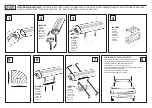
WARNING
Improper use of the trailer hitch can cause accidents and injuries. An improperly installed,
incorrect, or damaged trailer hitch can cause the trailer to separate from the towing vehicle
and cause serious personal injuries.
x
Only use an undamaged, properly mounted trailer hitch.
x
Never repair or modify the trailer hitch.
x
To reduce the risk of injury in rear-end collisions, and the risk to pedestrians and cyclists
when the vehicle is parked, always remove the ball mount when you are not towing a trailer.
x
Never install a “weight distributing” or “load equalizing” trailer hitch on your vehicle. The
vehicle was not designed for these kinds of trailer hitches. The trailer hitch attachment can
fail, causing the trailer to tear loose from the vehicle.
WARNING
Improper trailer towing can cause loss of vehicle control and serious personal injury.
x
Driving with a trailer and carrying heavy or large things can change the way the vehicle
handles, increase the distance it needs to stop safely, and cause accidents.
x
Always secure the load properly with suitable and undamaged straps so that the load will
not shift.
x
Always adapt your speed and driving to the heavier load and the weight distribution in the
vehicle. Take road, weather, traffic, and visibility conditions into account as well.
x
Reduce your speed even more than you otherwise would when going downhill and under
unfavorable load, weather, or wind conditions.
x
Trailers with a high center of gravity tip more easily than trailers with a low center of
gravity.
x
Always avoid sudden maneuvers and hard braking.
x
Be especially careful when passing other vehicles.
x
Reduce speed immediately if the trailer shows the slightest sign of swaying.
x
Never try to stop the swaying by accelerating.
x
Always obey speed limits. In some areas, the speed limits for vehicles towing trailers are
lower than for vehicles without trailers. Never drive faster than 50 mph (80 km/h; under
exceptional circumstances 60 mph - 100 km/h) when towing a trailer. This applies even if the
local speed limit is higher.
If you are driving a new vehicle or a vehicle with a new or rebuilt engine, do not tow a trailer
during the break-in period, about 600 miles (1000 km),
Parts, accessories, repairs, and modifications
.
If you tow a trailer, your vehicle may need maintenance more often because of the extra load it
has to move.
When you are not towing, remove the trailer hitch ball. This helps keep the trailer hitch from
causing damage to your vehicle and to others if your vehicle is hit from behind.
Some models need a trailer hitch to tow or tow-start other vehicles. You may want to always
carry the ball mount in the vehicle after it has been removed. Be sure to stow it securely.
















































